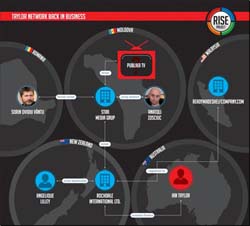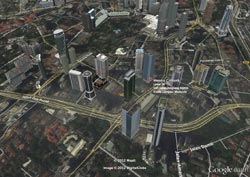Until it was shut down last year, the company registration business of New Zealander Ian Taylor was one of the most outrageous examples of the criminal services industry – companies that enable organized crime, terrorists and corrupt government officials to steal money, evade taxes and hide ownership. Now Taylor is back – with a new company and a new host country.
Publika TV is one of the largest television stations broadcasting in the Republic of Moldova, yet oddly, despite its influence and importance, it is impossible to determine who really owns it. On paper, the man who runs the company in charge of Publika is Anatoli Zosciuc, 46, a Ukrainian-born former mechanic and customs inspector.
Zosciuc does not have the resume of a media magnate. He is likely just a proxy.

Proxies are individuals whose names are used in the place of real owners who want to hide their identities as beneficiaries of companies. Proxies often do this for a fee, but sometimes they are victims of identity theft and don’t even know they are directors. OCCRP tried to reach Zosciuc but he did not answer his phone.
Publika’s ownership is even more complex, and troubling.
Publika is owned by a Moldovan corporation called Stiri Media Group, which in turn, is owned by a Rochdale International Limited of New Zealand.
Rochdale is owned by a nested set of companies that lead to another proxy – like a set of Russian Matrioshka dolls that fit one inside the other. This complex structure effectively obscures Publika’s true ownership and finances.
Rochdale International Limited is a phantom or shell company – a company that has no office, no staff and no bank accounts. It exists on paper to hide the real owners and beneficiaries.
The nominal director, or proxy, of Rochdale is the controversial offshore company formation agent Ian Taylor.
THE TAYLOR NETWORK
The business of Ian Taylor and his family is to register companies. They are well known to reporters, law enforcement, due diligence professionals, lawyers and others. Beginning in November of 2010, OCCRP published articles detailing how Taylor and his family helped build a network of offshore companies that criminals used to launder money, evade taxes and hide their identity through phantom companies. The reports showed how Russian crime networks and Asian organized crime groups, among others, used companies registered by the Taylors.
In the wake of the OCCRP report, New Zealand authorities cracked down on the Taylors.. In June of 2011, New Zealand authorities forced the shuttering of the Taylor’s registration empire including GT Group, the notorious registration agent used by so many criminals and terrorists over the years. Their businesses in the Pacific island of Vanuatu also closed. Thousands of the companies they had registered were delisted.
But Ian Taylor is back in business helping to hide the ownership of Moldova’s media.
The Taylors never ceased doing business in New Zealand. They just changed tactics, re-branded and shifted to a new website.
OCCRP discovered an active website, http://readymadeshelfcompany.com, that performs the same services in New Zealand that Ian Taylor said had been stopped. The website registered the phantom company Rochdale International, which links to Publika in Moldova through Stiri Media.
The website offers services that can be used to launder money and evade taxes including:
- Providing a pre-registered offshore company in a popular tax haven
- Opening and operating offshore bank accounts.
- Creating “nominee directors” and “nominee shareholders” to serve as proxies which allows hiding the real owners.
- Creating an offshore address with a Registered Agent.
They also can create a “Virtual Office” because, according to the website:
“Many businesses throughout the world suffer from poor location when entering the international market. A Virtual Office allows you to give the appearance of being located in a country known for its highly regarded and clean reputation.”
While none of these services are illegal and the Taylors offer services available from many other firms, what distinguished them is the remarkable array of criminals using their services.
In June of 2011, in breaking the news to his customers that the registration business would shutter, Taylor told his current customers that they would be transferred to another firm that would “incorporate a new structure in a reputable Asian jurisdiction” with services provided by “a bank you will already know and trust.”
Taylor’s customers appear to have been transferred to another Taylor-controlled firm with a new address. The website’s contact information lists the Menara Citibank in Kuala Lumpur, Malaysia – Asia — as its mailing address.
OCCRP called the offices of readymadeshelfcompany.com but a secretary in Kuala Lumpur said Ian Taylor was not there and no one was available to talk about the company’s business.
THE TAYLORS REBRAND, WITH A NEW PROXY
According to Internet registration information, the website of the firm was registered in 2009 to Charlie Kalopungi, a known proxy the Taylor family has used. It appears that many of the shell companies in New Zealand that Kalopungi and other proxies served as directors or shareholders were abruptly “struck off” (closed) in or before July 2011, when the authorities cracked down in New Zealand. But the Taylors had already begun migrating work to Malaysia and the majority of the new New Zealand-based shell companies offered on the site list Ian Taylor and a new proxy, Angelique Lilley, as directors or shareholders.
Rochdale International Limited was incorporated on Feb. 22, 2011. By Dec. 31, 2011, the company had changed addresses, Ian Taylor had changed addresses and the shareholder, RSHRS Limited had changed addresses. On Feb. 16, 2012, Lilley, the new proxy, became director and shareholder of a phantom company called Atherstone Limited. Atherstone, through a web of other shell companies, holds all the shares of RSHRS Limited and in turn, Rochdale International Limited.
Lilley, who listed her occupation as “mother,” as late as 2009 in New Zealand records, is now the proxy shareholder of one the biggest media companies in the Republic of Moldova.
Approached by a Fairfax New Zealand reporter at her back section house in Nayland Rd, Stoke, this week, Ms Lilley declined to answer questions or be photographed.
Who is Really Behind Publika
Before being owned by Rochdale International Limited, Publika was owned by a company from Cyprus called Bluelink Comunicazione. This company was founded by Sorin Ovidiu Vintu, a Romanian currently serving jail time on blackmail charges (P9_VINTU_JAIL). The same Bluelink is still a majority shareholder of a news television station in Romania, Realitatea TV. There are numerous connections between Taylor and Vintu.
Taylor has long partnered with Lazlo Kiss, a Romanian registry agent currently charged along with Vintu by Romanian authorities with embezzlement and money laundering via offshore companies. According to Romanian prosecution records, Kiss, whose own company is registered in New Zealand and owned on paper by Taylor, allegedly helped set up Romanian money laundering schemes for Vintu.
Taylor’s network of proxies also thrives outside of New Zealand and Eastern Europe.
Lilley is listed as director of more than a dozen shell companies based in England. Most of Charlie Kalopungi’s shell companies in New Zealand appear to have been struck off, but he is active as a proxy in other countries, like Panama. Other proxies include directors Victor Manuel Perez Acosta, who has an address in Mexico, and Nesita Mercea, who was struck off most of the New Zealand companies, but is also the director of more than 50 shell companies based in England.
TRANSPARENCY WILL HAVE TO WAIT, FOR NEW ZEALAND
The offshore financial networks that shroud company ownership also depend on government regulations that allow them to set up shop.
In an email to OCCRP, Alastair Stewart, the communications advisor in the New Zealand Ministry of Economic Development, wrote:
“As an open economy, New Zealand company law allows any person to form a company, so long as the company has a name, shares, at least one shareholder, and at least one director.”
According to Stewart, New Zealand authorities are taking additional steps to strengthen the financial regulatory system and anti-money laundering frameworks, including passing the Anti-Money Laundering and Countering Financing of Terrorism (AML/CFT) of 2009 that “will increase the ability of government and the financial sector to deter and detect money laundering and terrorist financing, and will substantially enhance New Zealand’s compliance with the FATF standards.”
Unfortunately, the law is unlikely to take full effect until June of 2013.
The Taylors do not appear to have broken New Zealand law. However, the Taylors’ activities have cost New Zealand international credibility.
In February of 2012, the European Union struck New Zealand from the banking and corporate “white list,” in part because a Taylor-registered firm appeared to be engaged in massive money laundering through Latvian banks. (see the Proxy Platform) The removal meant that the EU would not recognize or acknowledge New Zealand’s “know your customer” analyses due to the country’s weak anti-money laundering and anti-terrorism laws.
Taylor could not be reached for comment.
Reported and Written by Ion Preasca, Mihai Munteanu and Matt Sarnecki






